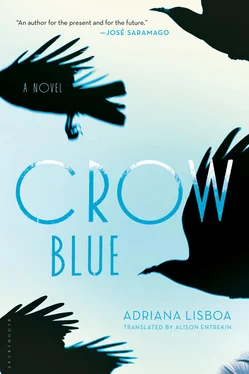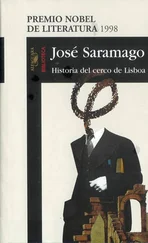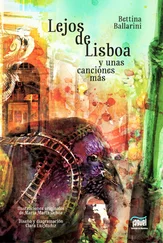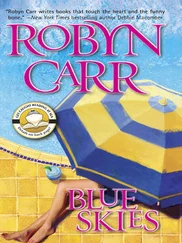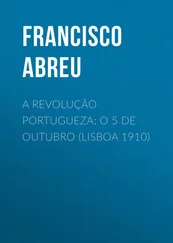During the dinner at her place in Albuquerque, she told us part of her story. The second part. I pieced her life together from back to front, like someone following footsteps from their point of arrival to their point of departure.
So you live here alone? I asked, and if I was indiscreet it was too late, but everyone forgives children for that, and at the age of thirteen I was still in the comfortable position of being able to choose the situations in which I wanted to be considered a child and those in which I didn’t, and to behave accordingly (there has to be some advantage in being thirteen).
Yes, she said, and the tortilla chips crackled in her mouth. But this house belongs to my ex-husband. He’s got another one.
Another house?
Another house, another wife, another family.
In Albuquerque? Fernando asked, plucking up the courage.
In Seattle. He and his wife have a five-year-old boy.
How long have you been divorced?
Three years.
We were sitting at the table, four people at a table for eight, and I looked at the empty chairs, which looked like sad, speechless guests with lowered eyes. Half of the table was alive; the other half wasn’t. Half of the table had plates, glasses, cutlery, tortilla chips; the other half didn’t.
Three years, Fernando repeated.
Your math isn’t wrong. My ex-husband always was a proactive kind of guy.
And just as Fernando was maybe about to apologize on his behalf and mine, for the overly Brazilian habit of wanting to know too many details about other people’s lives, she let out a hearty, sincere cackle, and the three of us smiled and only then did Carlos ask what proactive meant.
It’s like this, said Isabel. A guy who first chooses his new wife, then has a child with her, then gets a job and a house in another city, and only then leaves his old wife, is proactive.
Ah. I get it.
Carlos smiled, feeling smart for perceiving all the logic of that sequence. And it was an impeccable sequence. And logical.
Isabel smiled too, and I looked for traces of the bitterness that sometimes accompanies the jokes that adults make about themselves and didn’t find any.
But the house isn’t mine. One day I’m going to leave here, this house, this city. One day I think I’ll go back to Puerto Rico. I’ll go back again. The problem is that when I leave Puerto Rico I want to return, and when I return I want to leave again.
And Carlos said that he was going to return to El Salvador one day too, but just to visit, because now he was a Coloradoan. Or a Coloradan. Or whatever the name was. He was a non-native NATIVE. With mountains in the background.
I came here when I was eighteen, said Isabel. Then I went back to San Juan. Then I came back here again. I started working, met my husband, stopped working.
She shrugged.
I’m not proud of it. I’m thirty-four and what have I done with my life? Nothing. I live in his house, I live on the money he gives me. But I’m going to do something soon. I’m going to do something. Soon.
Be an actress? I asked.
And she looked at me with warmth in her eyes and crushed more tortilla chips with guacamole between her teeth.
Yeah, who knows? Maybe I’ll be an actress.
Then she took the twig of mint out of her glass and ate it and said to Fernando I’m going to make another two mojitos. The food must be just about ready.
And when she got up and went into the kitchen Fernando turned his head and followed her with his eyes and I remembered the oh-so-common Rio character: the guy-looking-at-a-woman’s-ass-as-she-goes-past. My mother used to say that we women should also look at men’s asses as they go past. Which made me more comfortable about collating my penile statistics (left/right) at the beach. Although I would have done it anyway. But Fernando kept staring even after the ass and its owner and her long colorful skirt turned and stood in profile at the kitchen counter, and when they bent over to get mint leaves from the drawer in the refrigerator, and when the owner of the ass’s arms scaled the top cupboard to get clean glasses and tossed the contents of the dirty glasses down the sink and turned on the garbage disposal, which went rrrrwmnwww, and stacked the dirty glasses in the dishwasher.
For a moment Fernando forgot that Carlos and I existed, and I looked at Carlos in search of solidarity. And that was when Carlos said he was feeling a bit weird. A bit nauseous.
After Operation Anaconda came Operation Marajoara. It started in October 1973. At first there were three hundred soldiers, all plainclothes, to fight what they estimated to be sixty-three guerrillas (the real number at that point was fifty-six).
In one week, Operation Marajoara had already reduced this number by four, all taken by surprise as they were preparing chunks of meat from two recently-slaughtered pigs. One of the men killed was the leader of Detachment A.
In its early days Operation Marajoara arrested a lot of locals, drove some crazy from the beatings they gave them, and set fire to houses and fields. People who refused to cooperate were punished. Sometimes they were placed head-down in barrels of water. Stuffed into one of those holes they used in Vietnam, with barbed wire over the top. Hung by their testicles.
The rainy season didn’t intimidate the operation. It would continue throughout that October, and would see out the year on the Araguaia.
Soon afterwards another guerrilla, said to be very beautiful, was caught. She was shot in the leg first, and a soldier approached her and asked her name. And she said guerrillas don’t have names, you bastard. I fight for freedom. And all of the soldiers in the patrol, almost ten of them, pumped the beautiful guerrilla full of bullets. Want freedom? There you go.
And soon after that another guerrilla was killed. He was found by his companions without his head — a trophy sent to the army base in Xambioá.
It became a fad and another combatant was decapitated after he was killed by soldiers.
Things weren’t going so well for the communists. Several subsequent actions were unsuccessful. They still didn’t have enough weapons or ammunition and many guerrillas no longer had any shoes. There were casualties and there were also deserters.
In the beginning the guerrillas had no idea of the size of the new military offensive. Little by little they learned. And that was how they spent Christmas of 1973, six years after they had moved into the region: listening to helicopters overhead. In other encounters with the forces of repression, throughout December, more of them were killed, including members of the guerrillas’ Military Commission — and among them the commander general, Maurício Grabois, who went by the codename Mário.
Fernando, who was no longer Chico and was now far away, didn’t know anything about it. He found out afterwards.
Afterwards he found out that the guerrillas who stayed in the area dispersed and then regrouped, trying to throw the enemy off their trail. But none of it did any good.
He also found out that a report from the Army Information Center, with the word SECRET (a word that was a hallmark of much of what went on in those days in that region, and would continue to be so for some time) stamped across the top said: To Cease Operation “MARAJOARA” before the enemy has been completely destroyed could allow them to rise up again, with even greater vigor and experience. It could even provide them with proof of the viability, in BRAZIL, of guerrilla warfare in the countryside as an instrument in the struggle for power .
In early 1974 a member of the guerrillas’ Military Commission fled the forest — Ângelo Arroyo, Chico and Manuela’s former commander at Detachment A. (He fled but insisted, back in São Paulo, that the armed struggle on the Araguaia should continue. Less than three years later, he was hunted down and murdered by the forces of repression.) Other members of the Central Committee, such as João Amazonas and Elza Monerat, hadn’t been in the Bico do Papagaio region for quite some time.
Читать дальше
